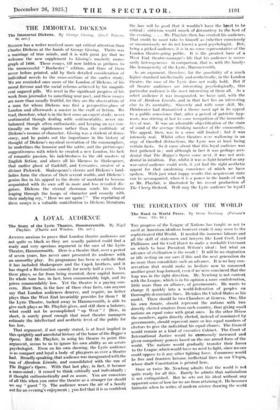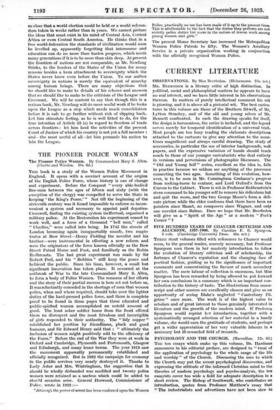THE FEDERATION OF THE WORLD .
Tan progress of the League of Nations has taught us not to cavil at American idealism however crude it may seem to the sophisticated Old World. It needed the immense labours and all the skill of statesmen and lawyers like Lord Cecil, Lord Phillimore and Sir Cecil Hurst to make a workable Covenant on which to base President Wilson's ideal : but what an advance of civilization is the result ! It will be no stagnation or idle resting on our oars if this and the next generation do no more than consolidate such an advance. It is no lazy con- servatism that would make us hesitate now to commend another great leap forward, even if we'were convinced that the leap was in the right direction. Mr. Newfang is not content with the League, which is in his opinion a mere confederation; little more than an alliance, of governments. He wants to change it quickly into a world-federation of peoples on thoroughly democratic lines. Hetakes the United States as his model. There should be two Chambers at Geneva. One, like his own Senate, should represent the nations with two directly elected senators from each country, thus giving small nations an equal voice with great ones. In the other Iguse the members, again directly elected, instead of nominated by govermnents, should represent more or less equal numbers of electors to give the individual his equal chance. The Council would remain as a kind of executive Cabinet. The Court of International Justice would be enormously increased and given compulsory powers based on the one armed force of the world. The nations would gradually transfer their forces to the League, which would have no need to fight, since no one could oppose to it any other fighting force. Commerce would be free and frontiers become, ineffectual lines in our Utopia, whose draft Constitution is printed here.
Once or twice Mr. Newfang admits that the world is not quite ready for all this. Rarely he admits that nationalism is' not extinguished. But he sets out his ideal without any apparent sense of how far we are from attaining it. He becomes fantastic when he writes of modern science drawing the world so close that a world election could be held or a world referen- dum taken in weeks rather than in years. We cannot picture the ideas that must exist in his mind of Central Asia, Central Africa or even Central South America. He thinks that in a free world-federation the standards of civilization would soon be levelled up, apparently forgetting that intercourse and education can do no more than hasten progress, which needs many generations if it is to be more than skin deep. At present the frontiers of nations are not comparable, as Mr. Newfang thinks, to the borders of the States of the Union for many reasons besides a keen attachment to sovereignty which the States never knew even before the Union. To our author sovereignty in nations is merely the equivalent of anarchy among human beings. There are many objections that we should like to make to details of his scheme and answers that we should like to make to the criticism of the League and Covenant. We will be content to say that though this is a serious book, Mr. Newfang will do more useful work if he looks upon the League as a step which needs much consolidation before it is safe to go further without risk of slipping back. Let him stimulate feeling, as he is well fitted to do, for the true intention of Article 23 (e) in regard to freedom of trade across frontiers : let him laud the activities of the present Court of Justice of which his country is not yet a full member : and—the most useful of all—let him persuade his nation to loin the League.







































 Previous page
Previous page